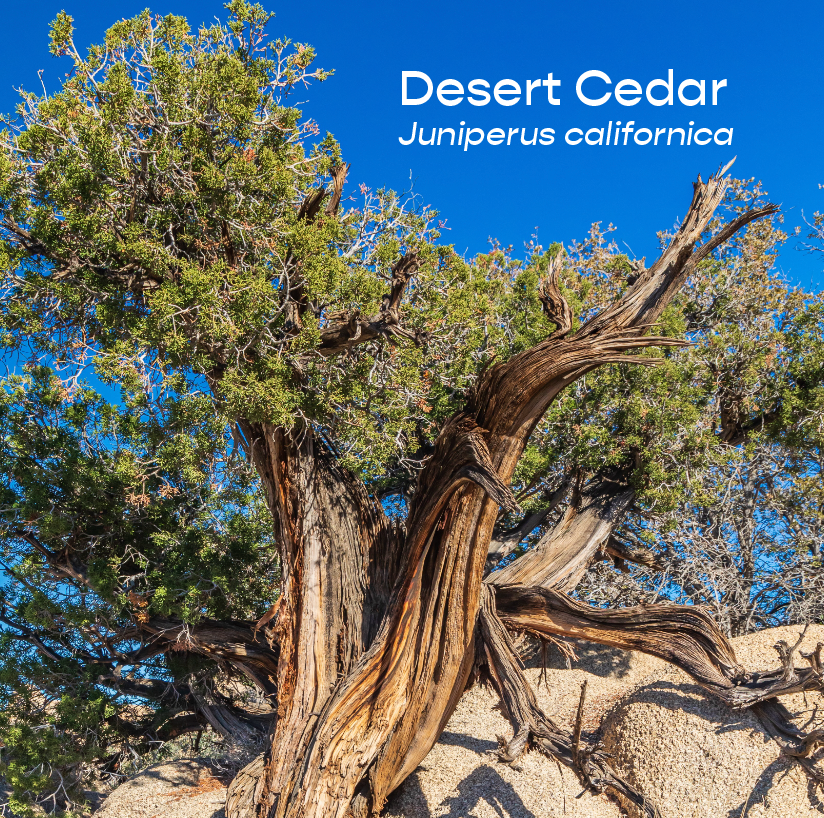Desert Cedar Aromatherapeutic Ritual Spray, 50ml
Desert Cedar Aromatherapeutic Ritual Spray, 50ml
Desert Cedar, Juniperus californica
Juniperus californica, commonly known as California juniper or desert cedar, is a species of juniper native to the southwestern United States and northwestern Mexico. It is typically found in arid regions, such as the deserts of California, Arizona, and Baja California, thriving in rocky soils and elevations from 2,500 to 5,500 feet. This hardy tree plays a vital role in the ecosystems of desert and chaparral environments.
Description
California juniper is a small, slow-growing evergreen tree or large shrub that can reach heights of 10 to 40 feet, depending on environmental conditions. The tree is characterized by its twisted, gnarled trunk and spreading branches, giving it a rugged, picturesque appearance. Its bark is reddish-brown and fibrous, often peeling off in strips. The foliage consists of scale-like leaves that are gray-green, providing drought tolerance by minimizing water loss through evaporation.
The tree produces small, berry-like cones that are bluish-gray and covered with a waxy bloom. These cones are about 0.5 to 1 inch in diameter and contain seeds dispersed by birds and other animals.
Habitat and Distribution
Juniperus californica is well-adapted to the dry, arid landscapes of the Sonoran and Mojave deserts, as well as other chaparral and desert scrub regions. It grows in a variety of soils, including sandy, rocky, and well-drained soils, and can survive extreme drought conditions. California juniper is often found in association with other hardy desert species, such as Joshua trees, pinyon pines, and creosote bushes.
Ecological Importance
California juniper provides essential habitat and food for wildlife in desert ecosystems. Birds, especially species like the phainopepla and American robin, feed on the juniper berries and help in the seed dispersal process. Small mammals, including jackrabbits and squirrels, also consume the cones and seeds. In addition to being a food source, the dense branches of the tree offer shelter and nesting sites for various species.
The tree also helps stabilize soils and reduce erosion in the arid, rugged terrains where it grows. Its deep root system makes it particularly effective in holding soils in place during windstorms and flash floods.
Cultural Significance
For indigenous peoples of the Southwest, California juniper has been a valuable resource for centuries. The berries were traditionally harvested and used as a food source, eaten raw or ground into flour for baking. The wood was used for fuel, construction, and crafting tools and ceremonial objects.
Juniper is also significant in spiritual and medicinal practices. The tree’s wood and foliage are burned in purification rituals, and the berries and other parts of the plant have been used in traditional medicine for treating a variety of ailments, including colds, digestive issues, and skin conditions.
Juniperus californica essential oil is derived from the California juniper or Desert Cedar, a resilient tree native to the arid regions of the southwestern United States and northwestern Mexico. This essential oil is less common than other juniper oils, such as those from Juniperus communis, but it holds unique therapeutic and aromatic qualities that reflect the tree’s desert environment.
Extraction and Aroma
The essential oil of Juniperus californica is typically obtained through steam distillation of the tree’s leaves, twigs, and berries. The oil has a rich, woody, earthy aroma with balsamic and slightly sweet undertones. Its scent captures the essence of desert landscapes, offering a grounding and calming experience.
Chemical Composition
California juniper essential oil contains a variety of terpenes and terpenoids, which are responsible for its therapeutic properties. Common compounds include:
- α-Pinene: Known for its anti-inflammatory, bronchodilator, and antimicrobial properties.
- β-Pinene: Supports respiratory health and offers antioxidant benefits.
- Sabinene: Offers anti-inflammatory and analgesic effects.
- Myrcene: Known for its sedative and muscle-relaxing properties.
- Limonene: Provides a fresh, uplifting citrus note and has antioxidant and antimicrobial effects.
Therapeutic Properties
Juniperus californica essential oil shares many of the benefits of other juniper oils but with its own distinct properties influenced by the desert environment:
- Respiratory Health: The oil can help clear the respiratory system, making it useful for colds, bronchitis, and congestion. α-Pinene and β-Pinene compounds act as bronchodilators, opening airways and facilitating easier breathing.
- Anti-inflammatory: The oil is often used to relieve muscle aches, joint pain, and inflammation. When diluted and applied topically, it can help reduce symptoms of arthritis and general soreness.
- Antimicrobial and Anti-fungal: The oil has **antibacterial and antifungal properties, making it a natural disinfectant and useful for skin conditions such as acne or fungal infections. It can be used in household cleaning products to naturally purify and freshen the air.
- Grounding and Calming: In aromatherapy, California juniper essential oil is valued for its grounding, calming, and centering effects. Its woody, resinous scent promotes relaxation, reduces stress, and supports emotional balance. It is often used during meditation or spiritual practices to enhance focus and inner peace.
- Skin Care: The oil’s astringent and antiseptic qualities make it beneficial for treating minor cuts, wounds, and skin irritations. It can also help improve the appearance of oily skin by reducing excess sebum production.
Cultural and Spiritual Significance
California juniper, like other juniper species, has deep-rooted spiritual significance in indigenous cultures of the American Southwest. The tree and its essential oil are often used in purification rituals and smudging ceremonies to cleanse negative energy and promote spiritual healing. The oil's grounding qualities make it ideal for enhancing spiritual practices and creating a sense of connection to the natural world.
Sustainability and Ethical Sourcing
Since California juniper grows in fragile desert ecosystems, it’s important that the essential oil is sustainably sourced. Overharvesting could threaten the populations of Juniperus californica, especially in areas already under stress from climate change and habitat loss. Ethically produced oil ensures that harvesting is done in a way that preserves the health of the tree and its environment.
Conservation and Threats
While Juniperus californica is not currently listed as endangered, it faces threats from habitat loss, climate change, and human activity, particularly in areas of urban expansion and agricultural development. The increasing frequency and intensity of droughts due to climate change also pose a challenge to the tree’s survival in already harsh environments.
Conservation efforts aimed at protecting desert ecosystems, promoting sustainable land use, and restoring degraded habitats are essential for ensuring the long-term health of California juniper populations.
Summary
Juniperus californica, or desert cedar, is a resilient and ecologically important tree in the arid landscapes of the American Southwest. With its twisted, ancient-looking form and ability to withstand extreme drought, the California juniper is both a symbol of endurance and a critical component of desert ecosystems, providing food and shelter to a wide variety of wildlife and holding cultural significance for indigenous peoples.
Share






